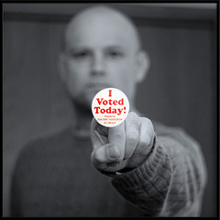Voting Early and Often
The deadline for registering to vote on “Super Tuesday” is today.

Today is the last day to register to vote in the Massachusettspresidential primary, which will be held along with primaries or caucuses in 22other states, on February 5, 2008, a date known as Super Tuesday. The Boston Election Department, located in Boston City Hall, Room 241, will be open until 8 p.m. tonight to accommodate last-minute registrants.
In the last two election cycles, poll workers witnessed a lot more ofwhat had previously been a true rarity: voters under age 25. Indeed,studies suggest that young voters are closing the age gap at the ballotbox. The question is, will this uptick in youth participation continueas a major force in the 2008 presidential race? As the January 16deadline approaches for registering to vote i Boston Universityinitiatives, both inside and outside the classroom, are under way tosustain the youthful political momentum on campus.
Fewer than half of 18-to-24-year olds cast ballots in the 2004presidential election, compared with 72 percent of those 55 and older.But between the 2000 and 2004 presidential elections, both registrationand voting by young adults increased by 7 percent and 11 percentrespectively, the largest increase of any demographic group. Theincrease continued in the 2006 race, and the spike has led someanalysts to predict that young people will be a key voting block in2008.
Still, Bruce Schulman, a College of Arts and Sciences history professorand director of graduate studies, points out that this isn’t the firsttime young voters have seemed poised to make a big electoral splash.Similar scenarios emerged, with disappointing results in terms ofturnout and impact, in 1972 and in 1992. But Schulman says things mightchange in 2008. For one thing, previous increases in young peoplecasting ballots were part of a general rise in voter turnout across allage groups; this year, youth participation is notably higher. He alsonotes, anecdotally, that for the first time, three different studentgroups have visited his classes this year in order to encourage peopleto register and vote. In addition, when young people turned out innumbers during previous elections, their votes were split between theparties; today, he says, “it seems that younger voters are skewing muchmore Democratic.”
Such opportunities include a course for BU students called ProjectCitizen — first offered in spring 2007, and again this semester — whichis focused, White says, “on the things you do between elections, suchas researching problems in your community, developing action plans toinfluence public policy makers, anticipating critics, and getting theword out to gain allies and pressure policy makers.” As a finalproject, students present a policy initiative at a mock legislativehearing.
As for voting itself, White calls it “a big, iconic, democratic ritual.It’s what brings us together.” He notes that more students may beinclined to register for the 2008 Massachusetts primary since thecommonwealth has moved its primary to Super Tuesday.
Even if BU students opt out of casting local ballots, White’s message remains: “Vote somewhere.”
“It may be that they’re eligible to vote in a state where the electionis going to be very close,” he says. “In which case, vote there, butvote.”
Chris Berdik can be reached at cberdik@bu.edu.
Comments & Discussion
Boston University moderates comments to facilitate an informed, substantive, civil conversation. Abusive, profane, self-promotional, misleading, incoherent or off-topic comments will be rejected. Moderators are staffed during regular business hours (EST) and can only accept comments written in English. Statistics or facts must include a citation or a link to the citation.